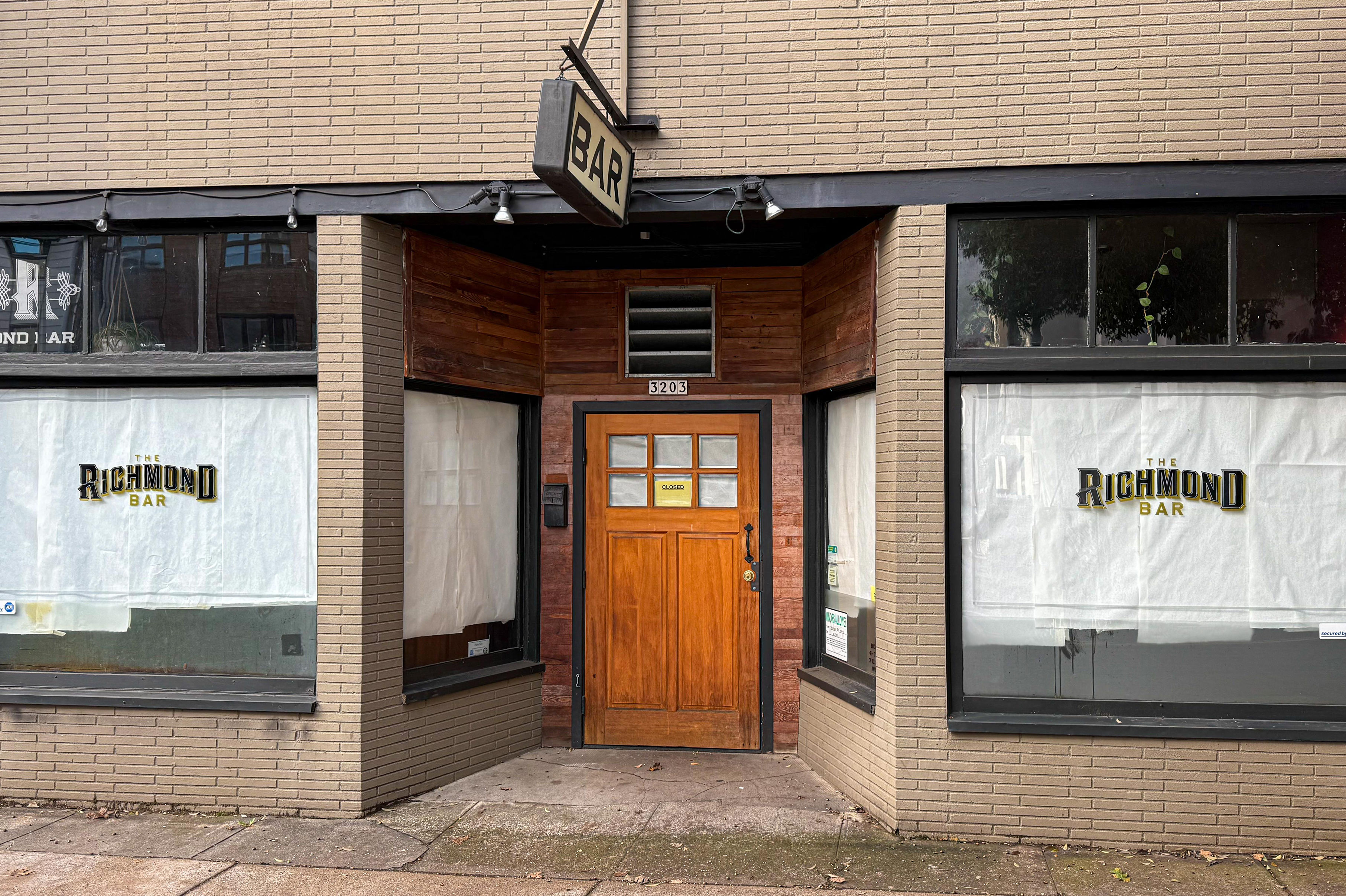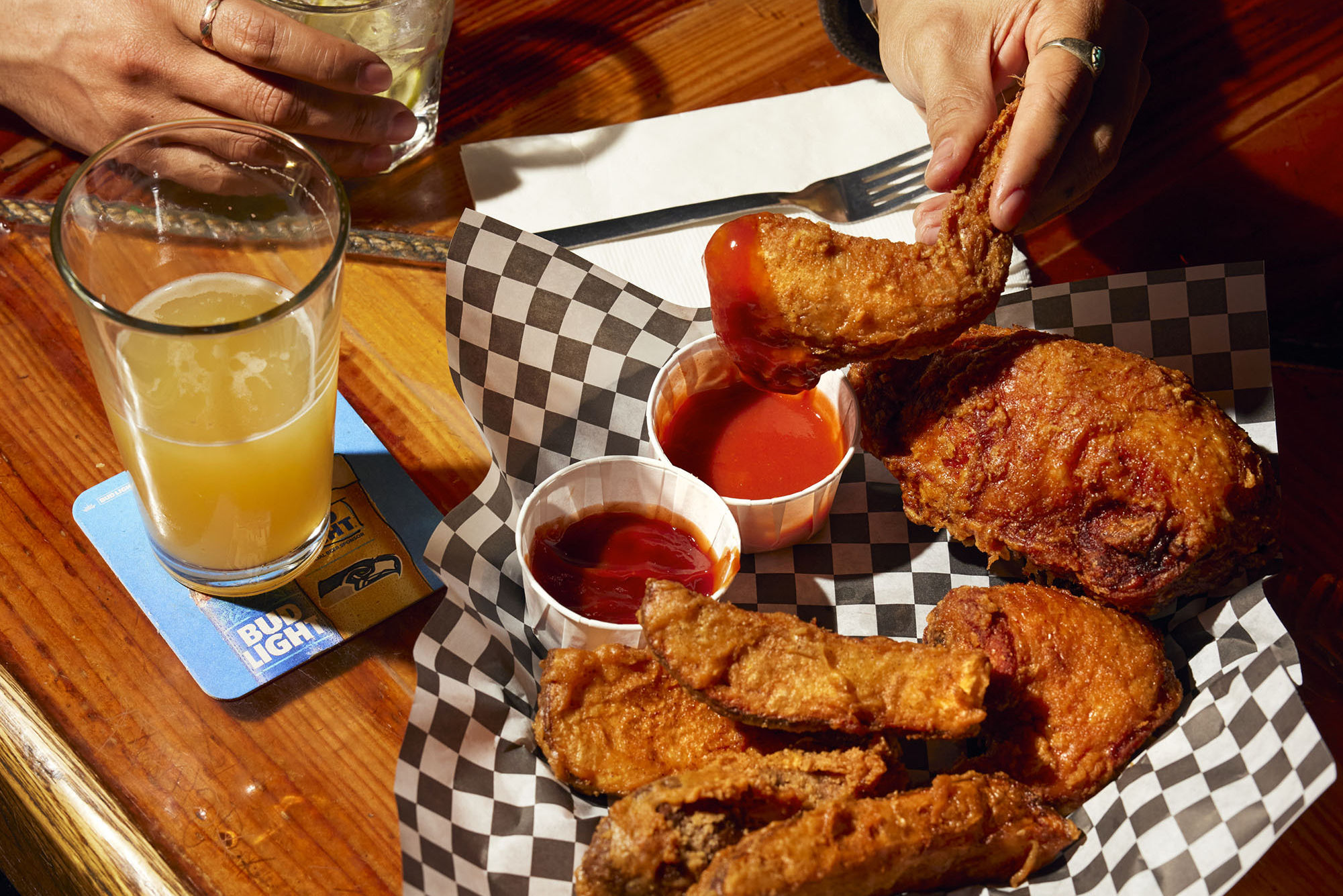Three Portland Trader Joe’s Workers Report from the Front Lines
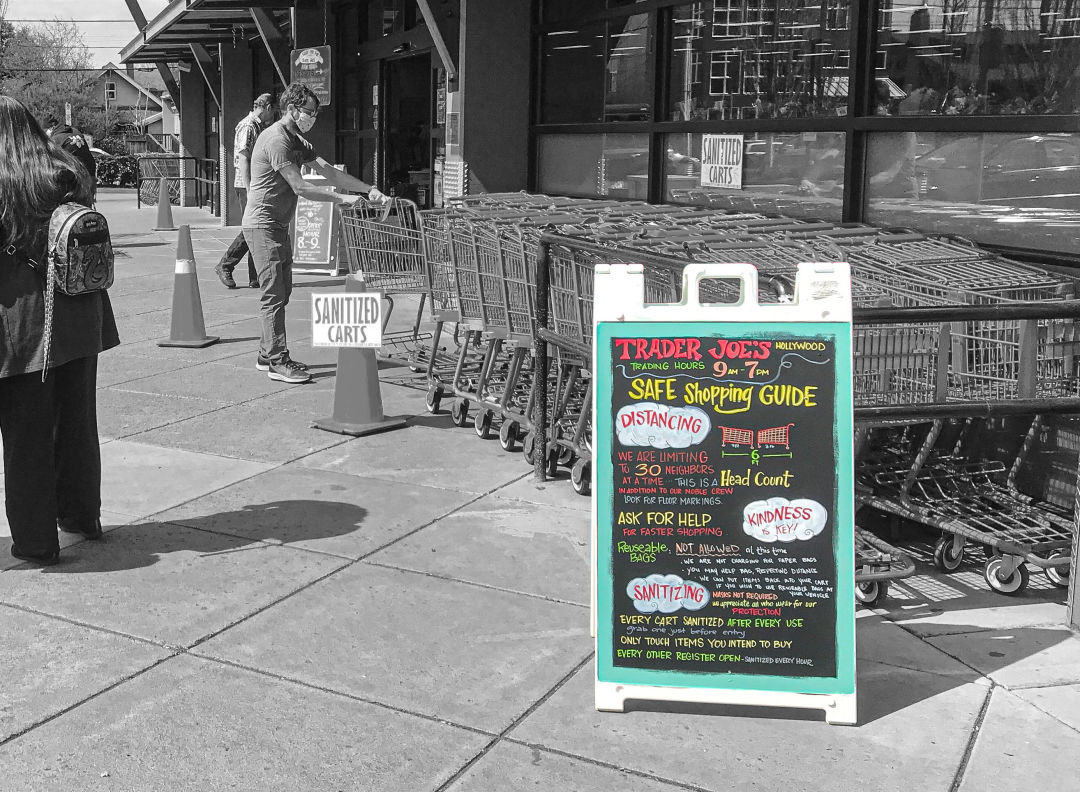
The scene at Trader Joe’s
Image: Michael Novak
We often assume baristas, bartenders, and waiters have rich, alternative lives as musicians, artists, or actors. But grocery store workers don’t have the same cultural cachet, invisible food service workers without the glamour. Few people give them a second thought, much less a hello. Now, during a pandemic shutdown, they’re the friendly face of society, operating registers and stocking aisles in one of the last bastions of life as we once knew it. But life is surely not the same for grocery workers, now often mentioned in the same breath as first responders. They’re not literally saving lives but risking their own while ringing up our eggs and potato chips.
Increasingly, employees are weighing the risks, sounding alarms around safety protocol and pay. A stark reality has emerged as some young supermarket workers around the country have died. But beyond the dramatic headlines, I’ve wondered: What thoughts rattle around their brains at work every day? What do they wish we knew about them?
Recently, three coworkers at the Hollywood-neighborhood Trader Joe’s shed light on this. Two have stayed, one is on leave. I wanted to know why. That simple question spiraled into a flurry of candid conversations captured below, their responses edited for length.
Meet Kristy Hathaway, Cailin Carlile, and Karleigh Brogan. Listen to their fears, hopes, observations, and complicated thoughts about being called a “hero.” They deserve your attention in the aisle, and out of it.
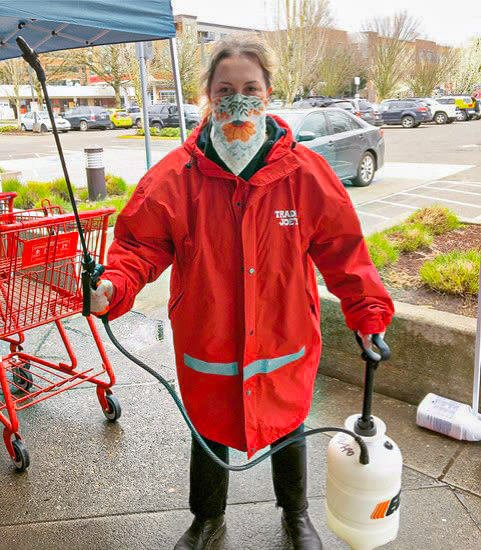
Kristy Hathaway in sanitation gear
Image: Kristy Hathaway
Kristy Hathaway, 29, recovering nonprofit worker
I ended up at Trader Joe’s by accident in 2018. I have a BA in nonprofit work, but my job was eliminated. Then my dad was diagnosed with cancer and I needed a flexible job to take time off. Turns out, I make more money at a grocery store than I did coordinating a nonprofit.
It’s weird how we’ve become “authorities” on the virus. I’m used to stocking the aisles, not telling people if they should wipe down their groceries with rubbing alcohol. When the panic shopping started, many customers said they had no idea how to “stock up.” They’re used to shopping every day, in the moment. One woman grabbed cans of beans and dried fruit. She told me she never eats dried fruit and doesn’t know why she’s buying it … just that she feels compelled.
Before this, I liked to wear gloves for handling money. Now, it’s just safer to sanitize our bare hands. We do it constantly. My knuckles are cracking and bleeding every day.
I don’t currently have health insurance. My father died in the fall. Then my fiancé was murdered. I had to take time off. At Trader Joe’s you have to work a certain number of hours to qualify for insurance in a period. I hope to work enough hours to get it back in July.
I need mental health care right now, given the losses I’ve gone through recently. Right now, it’s just “get up, go to work, put on a happy face,” even if I feel like a shell of a person. I feel for anyone working who’s had personal problems. You have to put that on the back burner and serve the community.
What do I wish people know about us? That most of us have college degrees—interesting lives. At times, customers treat us as if we’re unambitious or incapable of doing anything else. But that person bagging your groceries is also an incredible artist. The lady scanning your marinara sauce organizes fundraisers to help the houseless. Hell, that guy taking time to cut up an apple just for you to sample might also write the erotic fiction you read in your free time.
We all have different reasons for why we ended up at a grocery store and different reasons for why we stay now. It certainly wasn’t for the respect grocery workers get. Because up until now that did not exist in our culture.
Being called a hero makes me uncomfortable. My dad was a fire marshal. Now he was a hero. What we are doing is an incredible service—a job that no one else wants, yet everyone depends on. If anything good comes out of this, I hope it’s compassion and value for the invisible—the grocers, the sanitation workers, the people who pick your berries and fulfill your Amazon orders.
I’m exhausted when I get home. At work I think, “Is this the day I’ll get sick?” What will I do if the virus hits me? If I go to the hospital, will they turn me away without health insurance, even though I’m now a “hero”?
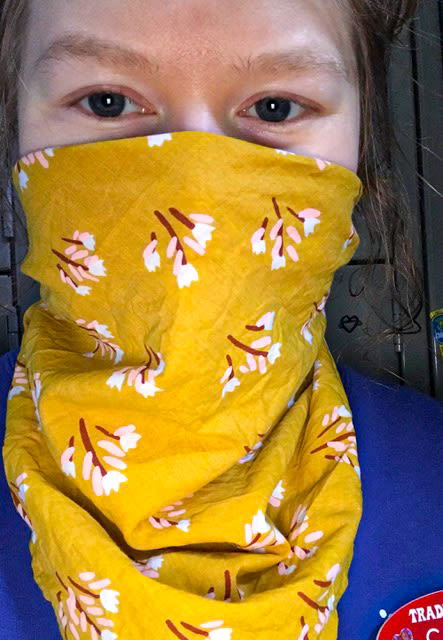
Cailin W. Carlile
Image: Cailin W. Carlile
Cailin Carlile, college student
I’ve worked at Trader Joe’s for 13 years, since I was 19. At first, it was just a job. Then the 2008 recession happened. All these people were applying for jobs, and I thought, ‘I’m not giving this up.’ Now, I don’t have a choice. I need the income for rent, food, and school.
Customer interaction used to be no interaction in the aisles. Often, no hello or any form of greeting at all. They’d just call out the name of what they were searching for, like “hummus!” or “orange chicken!” Now, they’re intrigued to talk to someone working during a public health pandemic. Conversations end with a jovial “Stay healthy and well!”
During the wave of panic and hoard-shopping, shelves were already bare when I got to work at 2 p.m. I felt my role went from stocking the shelves to community crisis manager. Customers had this look of shock and awe. Some took pictures on their phones. People reacted with a range of emotions—shock, anger, confusion, even blissful ignorance.
On a busy day we used to have 3,000 people coming through. Now, there’s no line at the register; the parking lot has open spaces. Our store used to feel like controlled chaos on a Sunday; now it’s controlled in a time of chaos. Roles have kind of reversed; we’re like hall monitors now, taking charge, reminding people to stand apart.
Gone are the days of people swinging by after a hike in the Gorge. No more after-Sunday-services rush, or folks buying premade salads and wraps on their work lunch. Families are not shopping together anymore. We used to hide a stuffed Sasquatch for kids to find, like a store adventure. Now there are no kids.
Working in customer service, we see these glaring sides of humanity: how people reach for free food, the grabbing, the airs of entitlement. I’m very intrigued to see what happens at the end of all of this. Will they still see us as heroes, an essential workforce?
One thing I’ve noticed recently: the personal attire of the customers has become a little comfier. Like, are those pajamas? I’m used to seeing people in their business casuals, after work.
Since we’re less busy, the work is less physical. But by the end of the day, I’m mentally exhausted from picking up on everyone’s fears. I clean every bit of my body after work. I can’t fall asleep afterwards. It’s overwhelming to think about; it’s the whole world. I can escape on days off; at work, there’s no escape.
The first few weeks were so unpredictable. Now, I feel safe at work because we, the employees, demanded that our store be a safer place to work. I know it’s my responsibility to not interact with people outside of work. But I do reach out to my neighbors, telling them, “Hey, I work at Trader Joe’s. I have the hookup on toilet paper.”
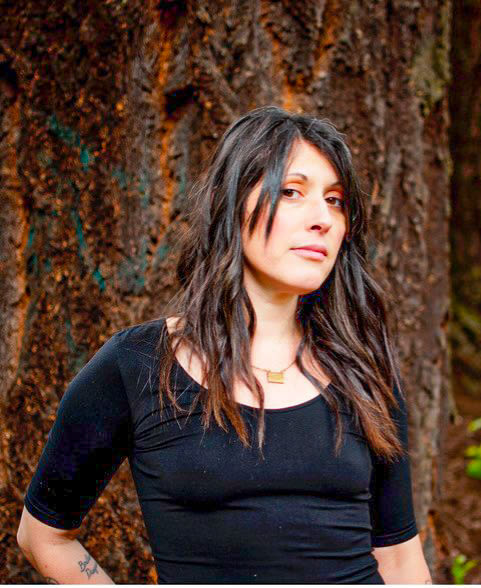
Karleigh Brogan
Image: Hannah Hayes
Karleigh Brogan, 40-something, MFA in writing from Portland State University
I’ve been at Trader Joe’s since 2004. I work with a bunch of creatives—amazing humans. In a guest column for the Huffington Post [“As A Grocery Store Worker, I’m On The Frontline Of Coronavirus And I’m Overwhelmed],” I said my job was the only thing keeping me sane. I left the day before that story came out.
I’m on leave of absence now, sheltering at home. I love Trader Joe’s, but I’m not willing to die for Trader Joe’s.
I admit, those early weeks of chaos could feel kind of fun. We were a troop; our regular staff huddles started to feel like strategy meetings.
During the crazy panic shopping, carts were overflowing. We had a rule, one toilet paper per customer. When one woman put two in her cart, another woman pulled one of them out and put it back on the shelf while pointing her finger. What frustrated me the most was not the hoarders, but the oblivious people, asking, “Why no samples today?” One woman was mad that we didn’t have boxed pinot grigio.
It’s seductive being called a hero. I see people throughout the company feeling very proud, like “these colors don’t bleed,” akin to police officers after 9/11. That spirit—that thrill—keeps a lot of people doing this. But it’s also insidious. I started to feel a little manipulated to stay on as a “hero.” We’re not trained or protected like first responders. A lot of people don’t understand the severity of this; they’re excited to be seen, appreciated, and respected. But at what cost?
I started worrying about my physical and mental health. The last day I worked was stressful. At one point, I needed to have someone come relieve me from my register just so I could go sit alone in the back room. I suffer from panic attacks—they feel like a sudden dropping sensation, that weightless feeling you get on roller coasters. Later, there wasn’t much left to do. The shelves were mostly empty, so I went around pulling forward a single jar of jam or the last two bags of flour. I didn’t know it was going to be my last day, but I stopped sleeping. I ended up getting a cold and called out sick for a few days.
I look forward to returning to work. It will mean that things have returned to some semblance of normalcy. I feel, because of all this, supermarket employees will never be regarded the same way again. Or one can hope.
I used to think working at a grocery store was no different than working in any other customer-service-based retail job. But it’s very different. I now realize there is some primal, deeply ingrained, psychological component to acquiring food. People can shop daily even if, practically speaking, it’s unnecessary. There’s never buyer’s remorse from a trip to the grocery store. Our purchases are justified, even if they are extravagant or extraneous. Perhaps because food literally converts into energy—into life. Even when our pantry is full, shopping for something to eat gives us a sense of buying more life.

